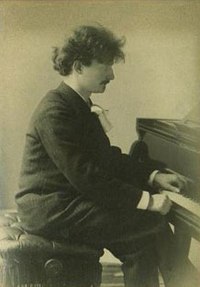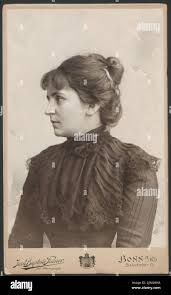With thanks to Professor Margaret Stetz for finding Helena for us
Helena Maria von Rosen was born on 1st August 1856 in Warsaw. Her parents were Baron Wladislaw Friedrich Johann Kasimir von Rosen, Polish of Baltic German descent and Zofia Taube, who met during his military service during the Crimean War. Zofia was born into a noble family of Baltic heritage whose ancestors came from Denmark. Helna’s mother died shortly after Helena's birth.
Helena met Ignacy Jan Paderewski when he was a promising young pianist. They were married in Warsaw on 31st May 1899.
As hostilities began in late July 1914, the Paderewskis were celebrating her husband’s name day and her birthday with their customary gathering of friends, musicians and politicians at their home in Switzerland. Their funds (and especially those of their Polish friends) were frozen in Lausanne (although they managed to live on credit), and travel became difficult. In November 1914, Russian Grand Duke Nicholas reportedly promised Polish independence after the war, but Paderewski feared it was a ruse to quieten rampant unrest and began working with Erasmus Piltz, Henry Sienkiewicz, Wincenty Lutosławski, Józef Wierusz-Kowalski, Jan Kucharzewski and other Polish exiles for Polish relief.
In January 1915, Paderewski planned a three-month trip to Paris, London and the United States, initially thinking he and his wife could lobby for Polish relief, as well as continue his concert career. However, they soon realized the difficulty of the task they had undertaken. Russia's ambassador in Paris, Count Alexander Izvolsky, was anti-Polish, though a politically necessary member of any relief committee of Polish exiles in that country.
Helena was able to visit Polish conscript prisoners from the German army, as well as start a doll-making project among nearly destitute Polish students and artisans in Paris. For the next few years, she hauled trunks of dolls and sold them in conjunction with her husband's concerts to develop profits to buy milk for Polish babies and do other good works. In London, Russia's ambassador Count Alexander Benckendorff helped Paderewski's Polish relief efforts both in Britain and its overseas colonies. However, the English public knew little about Poland, so Paderewski began writing letters to newspaper editors and some were published. So began his role as Polish spokesman. In April 1915, the Paderewskis boarded the transatlantic steamship Adriatic for the United States, but the sinking of the Lusitania the following month transformed their short trip into one of more than three years.
Dolls made by WW1 Polish refugees in France for sale through Helena Paderewska. These are on view in the Edinburgh Museum of Childhood and the photograph was taken by Dr. Margaret Stetz.
During their three years of travels in the United States, Canada and the Caribbean, Helena Paderewska organized help for the war's victims in Poland, as well as for Polish soldiers, who first fought in France and later on the Eastern Front. With the help of Polish emigrants in the United States, Paderewska founded the Polish White Cross in February 1918 (initially the Red Cross would not permit use of its name since Poland was not a country), and also helped found the Relief Society for Intelligence.
Helena died on 16th January 1934
 |
| From the Museum of Childhood in Edinburgh - photo by Dr. Margaret Stetz |
 |
| Ignacy Jan Paderewski |

